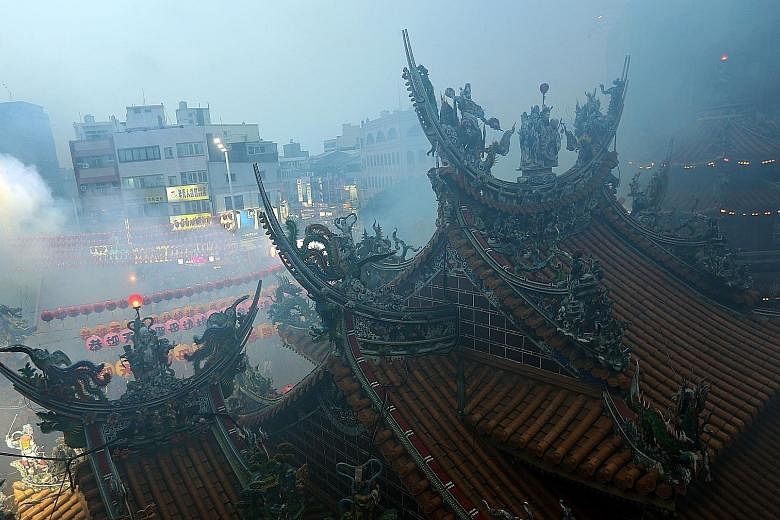TAIPEI • Smoke billows daily from temples across Taiwan as visitors burn incense and paper money to bring luck and prosperity - but that familiar fragrant haze could be a thing of the past as concerns grow over ritual pollutants.
The potential damage to the environment and to the health of devotees from staggering levels of dangerous particles in the air is leading some temples and festival organisers to seek alternative - if less spectacular - practices, despite resistance from some worshippers.
Famous temples such as the Taoist Nan Yao in Changhua city - one of the island's largest and oldest - are playing firecracker CDs instead of launching the real thing, as well as encouraging followers to clap hands to create smoke-free noise.
The popular Taoist Hsing Tian Kong temple in the capital Taipei has banned worshippers from burning incense, requesting that they simply bring their hands together to pray, instead of holding the burning sticks.
Other temples are sending paper offerings to be burned at state incinerators so the fumes can be treated.
And in New Taipei City, water lanterns that pollute the river have been replaced with a wall of lanterns outside a temple.
While the new alternatives may not be quite as atmospheric, activists say it is time for change.
"People come to temples to pray for good health, but the way they are worshipping is not healthy," said Mr Yeh Guang-perng, founder of the environmental group Air Clean for Taiwan.
"They might not get sick right away, but long-term exposure would be harmful to their health."
Taoism and Buddhism are the predominant faiths in Taiwan, each with millions of followers and with worship centring around temples and festival events.
During a nine-day pilgrimage last month in central Taiwan honouring the Taoist sea goddess Mazu, government monitoring revealed that levels of harmful microscopic PM2.5 particles reached more than 60 times the World Health Organisation's recommended levels along the route after multiple firecrackers were set off.
Environmental groups have also warned against hazardous chemicals, such as benzene and methylbenzene, released from burning incense and paper money.
But some devotees are reluctant to let go of the customs.
"The traditional belief is that the more firecrackers and incense used, the more sincere the faithful will appear and the more good fortune will be bestowed on them," said Mr Chiu Jainn-fuh, director of Nan Yao Temple.
The temple for the first time cancelled a budget of NT$1 million (S$42,000) for setting off firecrackers at a recent Mazu pilgrimage it hosted, but about half of its devotees refused to follow suit and set off their own, he said.
The authorities are banking on a scientific approach to persuade sceptical worshippers to go green.
The PM2.5 levels at last month's main Mazu festival pilgrimage were posted real-time online by Taiwan's Environment Protection Administration (EPA), which sent a dedicated team to follow the celebrations for the first time.
"We hope that with the scientific proof from the on-site data, we can persuade the public to change," said Mr Chen Shyan-heng, head of the EPA's air quality protection and noise control department.
The EPA has promised to impose new curbs on the amount, location and timings for setting off firecrackers within the next year after pressure from lawmakers shocked by air pollution at the Mazu event.
But the level of awareness has increased among devotees.
Interior designer Lai Su-hui said during a visit to a temple in central Taipei: "Sincerity matters the most and the gods will bless us."
AGENCE FRANCE-PRESSE

